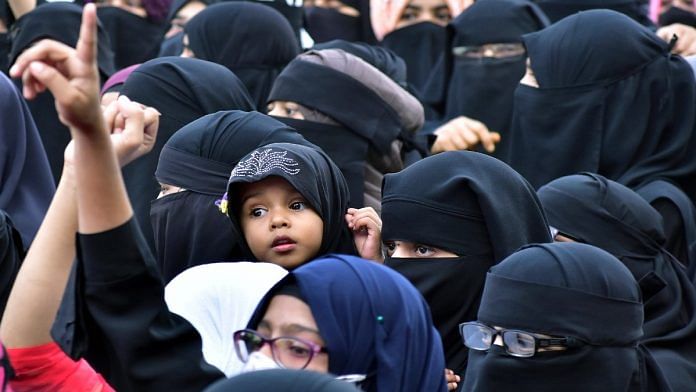New Delhi: If “right to dress” is an aspect of freedom of speech and expression under Article 19 of the Constitution, then “right to undress” will also be one of the elements of this provision, the Supreme Court observed Wednesday.
A bench of Justices Hemant Gupta and Sudhanshu Dhulia made this remark when senior advocate Devadatt Kamat, appearing for one of the petitioners challenging the Karnataka High Court’s verdict on the hijab ban, claimed the SC had declared “right to dress” as a facet of Article 19.
In response to this argument, the bench observed: “Right to dress would also include the right to undress.”
It further said: “Hypothetically, if you say the right to dress is a fundamental right, then tomorrow someone will say that I do not want to dress also.”
The bench was hearing a batch of petitions challenging the high court verdict of 15 March that upheld a Karnataka government order effectively empowering pre-university colleges to impose a ban on the wearing of hijab by Muslim girl students.
The government order had evoked sharp protests in the state with students refusing to abide by the prohibition. Some of the students had then moved the HC after some colleges barred them from attending classes for wearing hijab, and later approached the SC in the matter.
The petitioners in the SC continued with their arguments Wednesday — the second day of hearing in the matter.
Also read: Bilkis Bano case shows India does not value women as equal citizens
The court hearing
Kamat claimed that the right to dress has been declared a fundamental right by the SC and, therefore, only reasonable restrictions can be imposed on it.
However, Kamat submitted, the Karnataka government’s order against the hijab cannot qualify as a reasonable restriction. According to him, a right can be curtailed on certain grounds, as given in the Constitution. Restrictions on a right can be imposed subject to public morality, health, security of a state or if it is in state interest, among other reasons.
To explain his argument further, Kamat spoke of the apex court’s judgment delivered in 2014 in the NALSA case and first stressed on the point that “right to dress” is a fundamental right. The NALSA (National Legal Services Authority) verdict recognised transgenders as the third gender, affirming that the rights available to citizens under the Constitution would be equally applicable to them.
Kamat then went on to explain how the Karnataka government order against the hijab was an unreasonable restriction.
Kamat said the NALSA judgement held that rights conferred under Article 19 are basic rights, recognised and guaranteed as natural rights inherent in the status of a citizen of a free country.
“Freedom of expression is a term having wide import,” Kamat submitted, adding the judgment held that the “self-identity” of a gender can be expressed through one’s dress. This, he suggested, meant that fundamental rights include the “right to dress”.
However, the bench felt that Kamat was stretching his argument on “right to dress” to “illogical ends”. It then made the remark about “right to undress” also being a fundamental right if “right to dress” qualified as one.
The bench was of the view that the paragraph (part of the SC verdict) quoted by Kamat was a general comment on the “inherent status of a citizen in general” and did not conclusively hold that “right to dress” is a “fundamental right”.
However, Kamat sought to differ and submitted that his arguments were in the context of a uniform prescribed in a school, where no one “undresses”.
“I am not making a cliched argument, but a nuanced one. If it (right to dress) is an inherent part of my basic right, then the question is (whether) wearing of the additional dress is a part of Article 19 and if it can be restricted on the grounds other than what the Constitution permits,” Kamat argued.
“By actually saying if you come to school wearing a hijab, we will not allow you, the State violates Article 19. The (government order) is giving the petitioners a Hobson’s Choice (of taking what is available or nothing at all), forcing them to choose between their identity and dignity, and the right to education,” Kamat said, attacking the Karnataka government order, saying it violated several other constitutional rights, in addition to Article 19. These, he said, were Article 21 and 25 — guaranteeing personal liberty and freedom of religion, respectively.
The government order imposes restrictions that do not get attracted to the present case because it defies the test of proportionality, Kamat said.
According to him, wearing of hijab did not offend anybody’s morality, did not affect anyone’s fundamental right or any legitimate state interest. As for public order, Kamat said, the state had already conceded before the HC that the government order was not based on this ground.
Kamat also assailed the HC order for equating children with jail detainees. The Karnataka HC had in its order backed the hijab ban saying that in a pre-qualified public space, fundamental rights can be restricted.
However, the bench disagreed with this view and told Kamat that the HC’s observations were “general”. “The court wants to say that rights of an undertrial are less compared to general citizens, it is a way of expression, you may like it or not. But it does not draw a comparison. A school is a pre-qualified public space, set up to impart education to children,” the SC bench said.
“It is qualified because of the requirement of a particular situation. HC has given examples,” it further said. However, the court agreed with Kamat that the core question before the court is whether a fundamental right can be denigrated to become a derivative right.
(Edited by Nida Fatima Siddiqui)
Also read: ‘Blackmail, cheating, extortion, conspiracy’ — Jharkhand ‘editor’ SC backed is wanted in 34 cases



